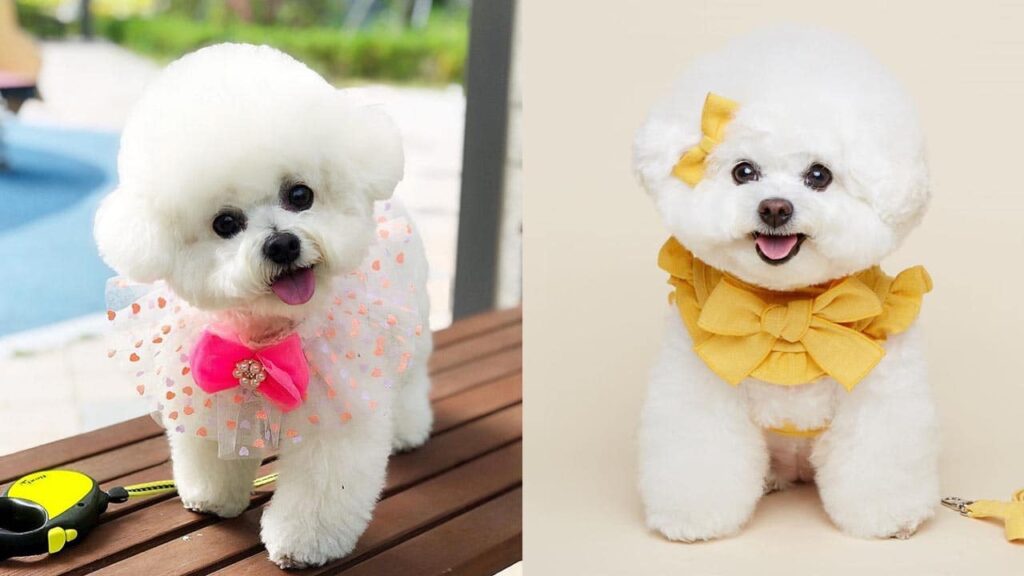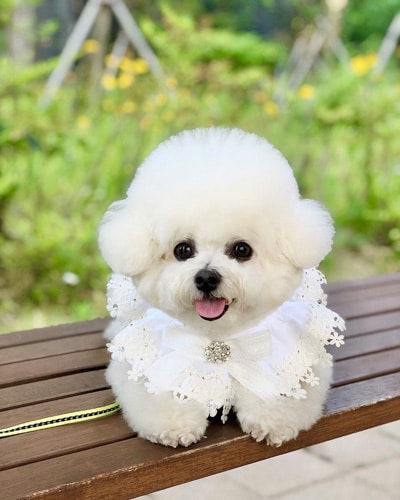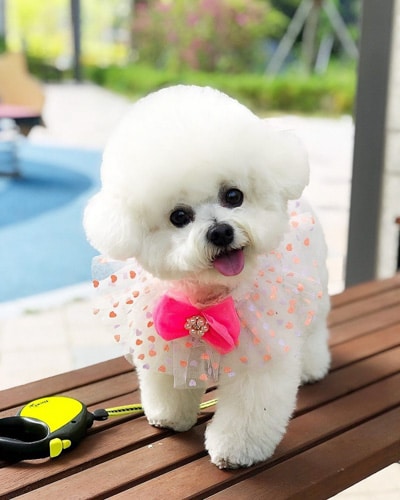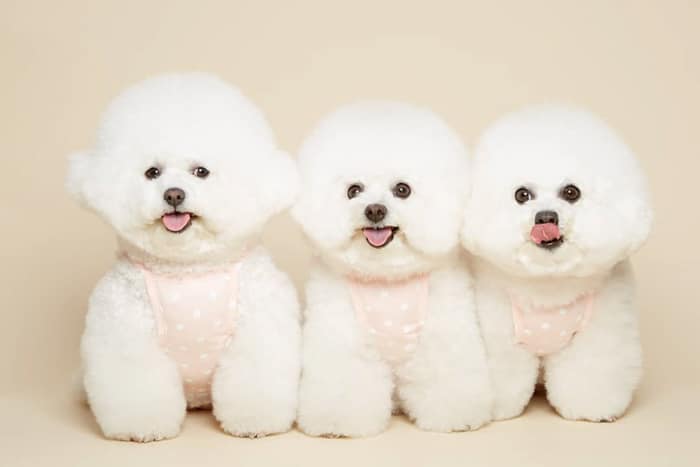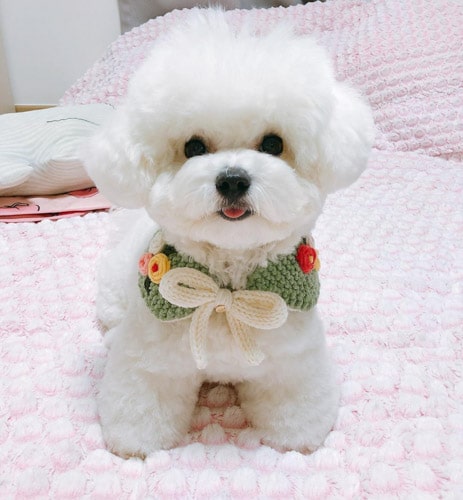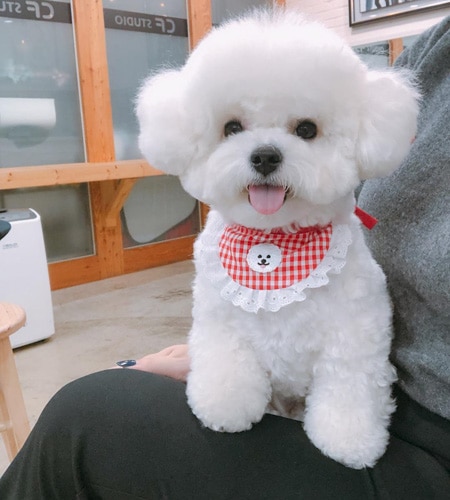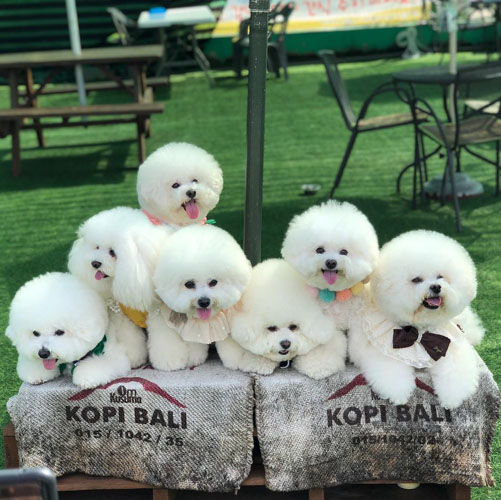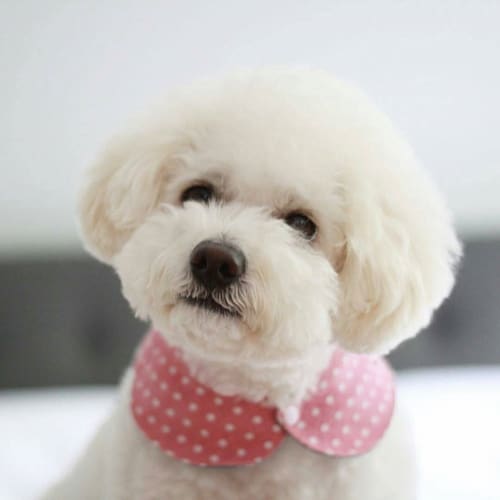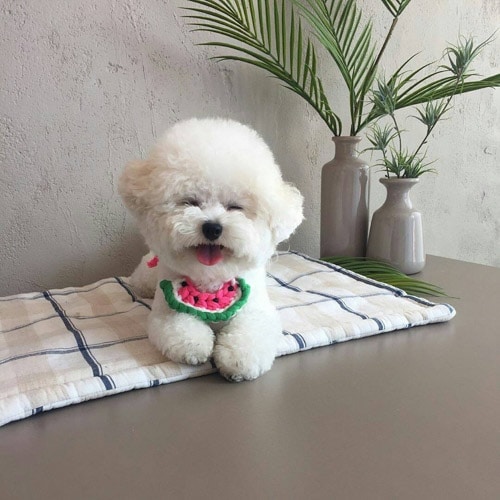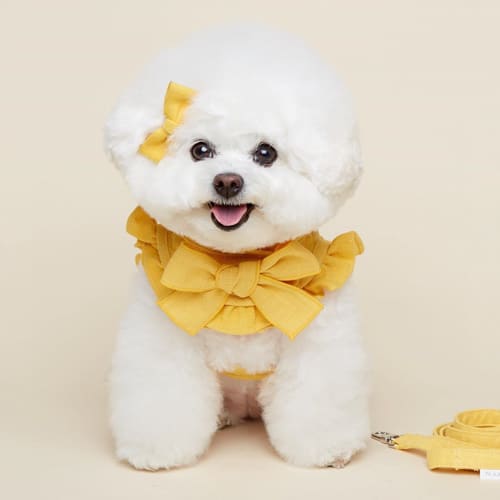Bichon Frise is an original French dog breed; its name means “curly white lap dog,” and it’s a small toy-dog, used solely as a companion dog or a house pet.
Bichons are playful, merry, and cheerful creatures that love the company.
They will feel the best as part of a family that takes them everywhere it goes.
This dog works very well with kids and other house pets, they are the ideal house pet.
Bichon Frise is one of the best breeds for allergic people, as they do not shed a lot.
These dogs are pretty long–living creatures, the longest living documented Bichon died at 19 years, but the average lifespan is about 12–14 years.
In case you are looking for an easy-to- socialize and happy dog to join your family, Bichon Frise might be the right choice for you.
In my blogs about the Bichon Frise dogs, I will write about the basic topics of interest.
For example, appearance, health problems, training, and many others. When I find a nice photo or video, I will post it here too.
In case you own a Bichon Frise, please send me your pictures so I can post them on this site.
And of course, if you run a site about Bichons, I will gladly publish it. Thanks and welcome.
Bichon Frise – possibly ideal dogs for people with allergies
Many people out there would love to have a dog, but they are unfortunately allergic to dog hair.
Bichons might be a perfect solution for such people.
Their coat is claimed to have hypoallergenic properties, meaning that proximity won’t trigger allergic reactions in people who are normally sensitive to dog hair.
These properties are attributed to their curly overcoat, which prevents dandruff from leaving the dog’s body and hairs from falling off.
This might be enough to prevent you from having an allergic reaction, but you can’t be sure that it will be.
People with mild allergies can keep Bichons without ever being bothered by the dog’s presence.
Still, those with more severe types of allergies would probably experience a possibly very serious attack.
That is why you shouldn’t rush into this without first consulting your doctor.
If he or she thinks that it might be ok for you to try it, go ahead. Of course, you shouldn’t just straight up go and buy a dog, try to arrange to spend some time with one first.
If you have a friend or an acquaintance with a Bichon, you might ask that person if it would be ok if you spent a couple of hours with their dog.
Even if you don’t experience any discomfort the first time, you might want to repeat this test a couple of times, just to be sure.
You could also arrange something similar to a forthcoming dog breeder.
Just make sure that the hair of other dogs does not contaminate the room you are doing your little experiment.
You should also consider doing this test with both an adult and young Bichon, their fur is not the same, and one might be safe while others could still trigger the reaction.
Some breeders will probably even give you the option of returning the puppy to them after the purchase if it turns out that you can’t keep it for whatever reason. Discuss this with the breeder before the purchase.
Even if it turns out that you are not allergic to your Bichon’s coat, don’t forget that they are a friendly breed, if you give the dog a chance to interact with other dogs, it might end up contaminated with some of their fur which can then trigger your allergies.
This might seem like a lot of bothers, but if you want a charming and cuddly pet, it might be worth the effort.
Creating a safe home for your Bichon Frise
This breed requires a lot of attention, and if you intend to raise a happy and healthy puppy, you will need to spend a lot of time with it.
However, you can’t constantly keep an eye on your puppy as much as you might want to.
That is why it is very important to create a safe environment in which your little wandering rascal won’t be able to find a way to get hurt.
You should get down on your hands and knees and survey the surroundings from the puppy’s perspective, inspect the rooms, and try to identify the openings that might seem attractive to a curious puppy and might contain dangers.
Once you do, block those openings. Always keep in mind the fact that puppies can’t wait to start chewing on things.
Make sure that there are no accessible electrical cords or small items that the puppy could swallow.
If you have “chewable” items that you wouldn’t like to see destroyed, move them out of the puppy’s reach or, if that is not an option, purchase a chew repellant and spray those items with it.
That should make them safe, but there are no guarantees.
Buying child gates would enable you to effectively confine the puppy to a single room, which you could make safe without too much effort.
A larger exercise pen might also be used, but they are usually too small to provide a comfortable long–term solution for your puppy.
If your puppy has free access to all of the room in the house, be sure to move wastebaskets out of its reach, they can be quite intriguing to a puppy, and just as potentially dangerous.
Until you manage to teach him to obey “sit” and” stay” commands, you should be very careful when opening any doors that lead to the outside, Bichon puppies are very energetic and curious, they will jump at the chance to gain access to the previously unavailable surrounding, and they might rush out onto the street the first time they get the chance.
Needles to say, this can be very dangerous, and you must do everything within your power to stop them.
If you have a fenced yard, make sure that there are no holes in your fence, even a small 5–inch opening might be enough for your puppy to crawl through and get lost on the street.
If that backyard also contains a pool, be sure to teach the puppy how to get out of it if he falls in.
When you can, take a swim with your puppy, not only will it be a good exercise for the dog, but it will also be able to practice getting out of the pool.
Once you are done swimming carefully, wash and rinse your puppy’s coat as the chemicals from the pool might cause some skin irritation and damage the dog’s coat.
Lastly, make sure that there are no poisonous plants in your yard and that you have eradicated fleas as well as you could because Bichons can develop serious allergies to flea bites.
Bichon Frise common health issues
As is the case with all breeds of dogs, Bichons have some hereditary diseases as well as several often occurring conditions that can damage their health, or even be fatal.
Luckily for them and their owners, most of these conditions are not lethal, and the frequency with which they appear is not staggering.
However, it is still a prudent move to get acquainted with some of the more common conditions that might afflict your furry friend as that might enable you to recognize the symptoms on time, and either save the life or your dog or at least, spare him some discomfort.
The first thing you should know is that if you are buying a Bichon, you should buy one from a reputable breeder.
As such, breeders consider the medical history of the dogs they intend to pair up to minimize the possibilities of hereditary disorders in their progeny.
This is very important as careless pairing up of dogs who share the same genetic faults significantly increases the chances of the faults being present in their puppies.
Cancers are the most common cause of death in Bichons (apart from old age, naturally).
The most common types are prostate cancer in male Bichons and mammary gland cancer in females; luckily, neutering or spaying your pet reduces the chances that these types of cancer will develop.
Less serious and much more manageable problems with Bichons, but also much more frequently appearing, are dental problems.
Gingivitis is particularly problematic as it can cause bladder and kidney infections.
Also, germs that mouth is full of can get in the bloodstream if the mouth hygiene is not adequate.
This is why it is vital to take good care of your Bichon’s oral hygiene; you should take him to the vet at least once a year for scaling and try to keep his teeth as clean as you can. Teeth loss can also lead to problems with digestion.
Bichons offer suffers from different allergies, but they are rarely a serious problem; in the vast majority of cases, all they cause is slight discomfort and nothing more.
If you notice that your dog is often suffering from them try to find the cause, it might be something he inhaled, such as pollen or some molds, or it might be a reaction to the shampoo you are using when bathing the dog.
One condition you need to keep a lookout for is primary ciliary dyskinesia; it is a hereditary problem that affects the dog’s respiratory system.
If you notice that your dog’s nose is constantly runny and that the dog is often showing signs of respiratory problems, don’t sign this off as a prolonged cold, but consult your vet as soon as possible.
It is important to do this quickly as this condition increases the chances that pneumonia will develop.
Also, make sure that your dog always has access to a lot of freshwaters, as that is the best way to prevent the onset of kidney and bladder diseases, which can be fairly common in this breed.
Bichon Frise puppy care
Bichon Frise puppies are adorable, but as much as you enjoy playing with them, you must remember that they are also very frail and vulnerable.
Take care not to expose them to excessive stress, as that might leave both physical and psychological consequences.
It will probably already be over ten weeks old if you bought your puppy from a reputable breeder.
Before bringing the puppy home, you should make sure that you are bringing it into a safe and welcoming environment.
Prepare a crate for the puppy and a place where it will eat and drink, once you bring it into your home the puppy needs to immediately be shown which areas of it are designated for his activities.
The probabilities are that the puppy has not been vaccinated; if that is the case, call your vet and see what needs to be done.
Try to buy the best available dry food for your puppy, it is still developing, and a regular, balanced diet is crucial to its proper growth.
At first, you should prepare three meals a day at regular intervals, later on, you can reduce this to two meals with snacks or treats in between.
Be gentle and patient with your new friend, Bichon Frise are notoriously difficult to housebreak, don’t yell at the puppy when it makes a mess, and eventually learn, and your scolding will not make the process go faster.
It will only frighten the puppy, which is already having a difficult enough time adjusting to the new environment.
It is your task to make that adjustment as smooth as possible, help the puppy socialize by bringing friendly people into its environment and spend a lot of time with the puppy, let it get used to your presence, and soon enough you will discover just how cheerful this dog of this breed can be.
